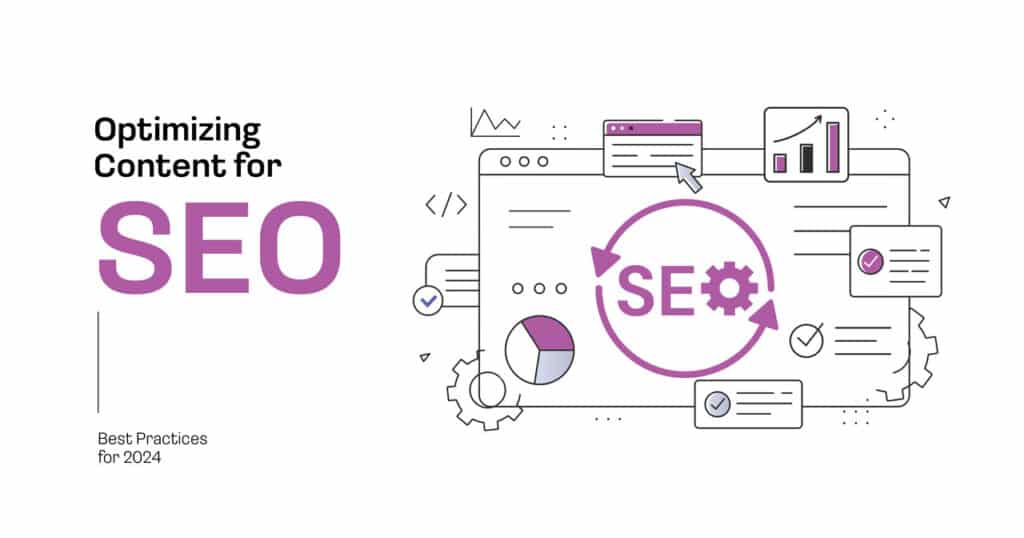Welcome to the ever-evolving world of SEO! If you’re looking to get ahead in 2024, you’re in the right place. Search engine optimization is crucial for driving organic traffic, improving visibility, and achieving online success. SEO isn’t just about getting your site noticed—it’s about getting noticed by the right people at the right time, driving valuable conversions. In today’s competitive landscape, understanding how to leverage content for SEO is key to standing out in search engine rankings.
Essential Takeaways
- High-Quality Content is Key: Creating high-quality content that meets users’ needs is essential. This involves crafting pieces of content that are relevant and engaging. Each piece of content should target specific relevant keywords and be structured with clear headings and meta descriptions to boost search engine rankings and organic search traffic. Incorporating long-tail keywords can help in targeting more specific queries, further enhancing your SEO efforts.
- Technical SEO Matters: Optimizing your site’s speed, ensuring mobile-friendliness, and using structured data are critical for search engines to crawl, index, and rank your site effectively. Don’t overlook these technical aspects, as they can significantly impact your conversion rate and bounce rate. Implementing Core Web Vitals is another critical step to ensure your site is optimized for both users and search engines.
- Stay Current with SEO Trends: The SEO landscape is always changing. Keeping up with the latest trends, including AI and voice search optimization, is crucial. Regularly updating your SEO strategy to adapt to new technologies and maintain a competitive advantage is key to staying ahead. Utilizing content optimization tools can help in refining your content strategy to align with the latest SEO trends.
In this guide, we’ll explore the latest SEO best practices, including on-page and technical strategies, and highlight emerging trends to keep you ahead of the curve. We’ll cover everything from crafting SEO-optimized content to understanding the role of AI in SEO. So, let’s dive in!
Why SEO Matters in 2024
The Evolution of SEO
SEO is not static; it’s a dynamic field that continuously evolves. Over the years, SEO strategies have shifted from keyword stuffing and backlink schemes to a more nuanced approach focusing on user experience and content quality. In 2024, SEO is all about providing real value to users, understanding user intent, and leveraging new technologies like content optimization tools to enhance your online presence.
Understanding SEO in the Modern Context
At its core, Search Engine Optimization is about making your website more accessible and relevant to search engines. This involves optimizing your site so that it ranks higher in search engine results pages (SERPs). Understanding how search engines work, especially with the complex search engine algorithms they use, is essential for effective SEO. Today’s algorithms are designed to deliver the most relevant and high-quality results to users, making it vital to align your SEO strategies with these goals.
On-Page SEO Best Practices
Crafting High-Quality Content
Creating high-quality content is the backbone of SEO. Search engines prioritize content that addresses users’ queries and provides value. This means your content should be relevant, informative, and engaging. Start by identifying what your target audience is searching for. Use keyword research tools to discover relevant keywords and incorporate them naturally into your content. This practice will not only increase your content’s relevance but also boost its content score. Remember, it’s not just about target keywords; it’s about satisfying the user intent behind those keywords. New content ideas should focus on addressing specific queries that align with informational intent, leading to a higher content rank.
The Role of Content Structure
How you structure your content plays a significant role in SEO. Use headings (H1, H2, H3) to break up your text and make it easier for both users and search engines to understand. Your primary heading (H1) should clearly indicate the main topic of your page. Subheadings (H2, H3) should organize your content into sections that address specific aspects of the topic. Additionally, optimize your meta descriptions and title tags to accurately reflect the content of your page and entice users to click through from the SERPs. This practice not only enhances user experience but also improves your content rank. Internal linking between related content pieces can also improve your site’s link equity and overall search rankings.
Enhancing User Experience
Mobile Optimization
With more people accessing websites via mobile devices, mobile optimization is crucial. A mobile-friendly website improves user experience and helps with SEO rankings. Ensure your site uses a responsive design that adjusts to different screen sizes. Optimize images for faster loading times, and make sure buttons and links are easy to click on mobile devices. Remember, optimizing for mobile also means improving your site’s Core Web Vitals, which are key metrics in Google’s ranking algorithms. Integrating visual content that loads quickly and adjusts seamlessly to various devices can also boost engagement.
Improving Site Navigation
Good site navigation is essential for both user experience and SEO. A well-structured site helps users find what they’re looking for quickly and easily. Use clear and descriptive menu labels, organize your content logically, and include internal links to guide users to related content. This internal linking not only improves usability but also passes link equity throughout your site, boosting your search rankings. Incorporating topic clusters into your navigation strategy can help enhance the user’s journey through your content, improving the overall conversion path.
Technical SEO Essentials
Understanding Technical SEO
Site speed is a critical factor for SEO and user experience. A slow-loading site can frustrate users and lead to higher bounce rates. Tools like Google PageSpeed Insights can help you analyze and improve your site’s speed. Consider optimizing images, leveraging browser caching, and minimizing JavaScript to enhance your page load times. Improving site speed directly impacts your conversion path, leading to better user engagement and higher conversion rates.
Ensuring Crawlability and Indexability
For search engines to index your site, it must be crawlable. This means search engine bots should be able to access and read your site’s content. Use a clean site structure and ensure your robots.txt file and XML sitemaps are correctly configured. Avoid duplicate content issues by using canonical tags to indicate the preferred version of a page. Also, make sure your URL structure is SEO-friendly, which helps both users and search engines navigate your site more efficiently. Regularly conducting a content audit can help identify and fix any crawlability issues, ensuring your content remains discoverable.
Leveraging Structured Data
What is Structured Data?
Structured data is a way of formatting your content so that search engines can better understand it. By using schema markup, you can help search engines understand the context of your content and provide richer search results. For example, you can use structured data to mark up reviews, events, or product information. This strategy can enhance your content’s discoverability and improve your overall content quality.
Implementing Schema Markup
There are various types of schema markup you can use, such as Local Business, Article, and Product schemas. Implementing schema involves adding specific code to your HTML that provides search engines with more details about your content. Tools like Google’s Structured Data Markup Helper can guide you through the process. Schema markup is a crucial part of your content optimization strategy, helping your content pieces stand out in the SERPs. Integrating topic model techniques into your schema can further enhance the relevance of your content, ensuring it aligns with user queries.
SEO Trends and Innovations for 2024
Voice Search and AI
Adapting to Voice Search
Voice search is becoming increasingly popular, and optimizing for it is essential. Voice queries are often longer and more conversational than text-based searches. To adapt, focus on natural language keywords and create content that answers common questions in a straightforward, conversational manner. This approach will help you target long-tail keywords, which are crucial for capturing voice search traffic.
The Role of AI in SEO
Artificial Intelligence (AI) is transforming SEO. AI tools can help with keyword research, content creation, and data analysis. For instance, AI-driven tools can analyze search trends and suggest content ideas based on user behavior. Embrace AI to streamline your SEO efforts and stay ahead of the competition. Incorporating AI into your content creation process can lead to more accurate targeting of relevant keywords, enhancing your content’s performance and relevance. Tools like Google NLP and Clearscope offer advanced capabilities to ensure your content optimization efforts are both effective and aligned with the latest SEO trends.
The Future of SEO
Anticipating Search Engine Algorithm Updates
Search engine algorithms are constantly evolving. Staying informed about algorithm updates helps you adjust your SEO strategies accordingly. Follow industry blogs, attend webinars, and engage with SEO communities to stay updated with the latest changes and best practices. By staying ahead of these updates, you can maintain a high content score and ensure your content pieces remain relevant and competitive.
Putting It All Together
Developing a Comprehensive SEO Strategy
Effective SEO requires a well-rounded approach that integrates on-page, technical, and content strategies. Start by auditing your current SEO practices, set clear goals, and develop a plan that addresses all aspects of SEO. Monitor your performance and adjust your strategies based on data and results. Incorporate tools like Google Analytics and Google Search Console into your optimization process to track and improve your SEO efforts.
Continuous Learning and Adaptation
SEO is not a one-time task but an ongoing process. Continuously educate yourself on SEO trends and best practices. Regularly review and update your content, optimize for new technologies, and adapt to changes in search engine algorithms to maintain and improve your rankings. Engaging in continuous learning ensures that your SEO strategy evolves along with the search landscape, keeping your content fresh and relevant.
Ready to Boost Your SEO?
Implement the best practices discussed in this guide to enhance your SEO efforts and achieve better results in 2024. Subscribe to our newsletter for more tips and updates, or get in touch for a free SEO audit. Whether you’re a content creator, marketer, or business owner, mastering SEO is crucial for your success in the digital landscape.
FAQs
1. What are the key components of SEO in 2024?
In 2024, key components of SEO include high-quality content, mobile optimization, site speed, user experience, and technical SEO. Additionally, integrating structured data and adapting to trends like voice search and AI are crucial for effective SEO.
2. How can I improve my site’s loading speed?
To improve site speed, consider optimizing images, leveraging browser caching, minimizing JavaScript and CSS, and utilizing a Content Delivery Network (CDN). Regularly monitor your site’s performance with tools like Google PageSpeed Insights and make necessary adjustments.
3. What is structured data and why is it important?
Structured data is a way of formatting content so that search engines can understand it better. By using schema markup, you provide additional context about your content, which can enhance search results with rich snippets and improve visibility.
4. How can I optimize my content for voice search?
To optimize for voice search, focus on natural language and conversational keywords. Create content that answers common questions directly and clearly. Use question-based headings and include FAQ sections to align with how people speak when using voice search.
5. What role does AI play in SEO?
AI plays a significant role in SEO by enhancing keyword research, content creation, and data analysis. AI tools can provide insights into search trends, automate repetitive tasks, and help optimize content based on user behavior and preferences









